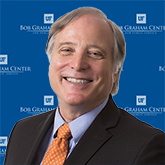Dennis K. Hays, Gator alum, career foreign service professional and former ambassador to Suriname, can help you decide if a career overseas may be right for you.

Hays’ skills and experiences show aspects of the foreign service and other international careers that cannot be explained by an application or job description.
If you enjoy the idea of living and working overseas, or even just improving your ability to communicate in daily life, then what follows is for you.
The Skills
Hays delivered his comments during a recent professional development program for University of Florida students hosted by the Graham Center.
In his remarks, he stressed the importance of building certain skills now — not because the skills would assist your career, but because they will enhance your life. These skills, he said, require a level of effort and dedication on top of the day-to-day responsibilities of attending classes or performing a job.
“One thing I did not realize when I came in (to the foreign service) was the importance of networking, of talking to people. Figure out ways to work the conversation. Find commonality, something to talk about where they have an interest, where you have an interest,” he said. “You’ve got to work at it.”
For those planning a career overseas, he notes three areas especially important to develop:
- A talent for getting to know people around you personally
- The ability to articulate both sides of a disagreement, and
- A knack for socializing with people of various identities and experiences.
These are good competencies to master in any career, but are especially helpful in an overseas arena.
“The coin of the realm is information, and whatever your job is, if you can provide accurate, timely information in the area where you’re working, then you have great value, to your bosses, and to the nation for that matter,” Hays said.
Cultural Sensitivity
The key decision when considering a career overseas is whether or not you want to be in a foreign culture, Hays said.
“You have to want to live and work overseas, you have to have an eagerness to do that,” he explained.
“You would be surprised at how many people – including members of the foreign service – who hate foreigners, and they live overseas, in the middle of foreigners.”
“They tend 1) not to be successful, and 2) they tend not to be happy,” he added. “You have to be willing to immerse yourself in a different culture, to deal with different people, and recognize what they can tell you and what you can tell them along the way.”
While a basic academic background is essential, it’s often more subjective skills, like the ability to adapt to situations and apply analytical thinking to complex problems, that make or break a foreign service career, he said.
Hays recalled a difficult experience in Guyana with an employee who hired in there as a junior officer. Even though “brilliant” and well-educated, the individual’s lack of social skills and practical knowledge signaled failure early on.
“He didn’t know how to drive a car, and he had no social skills. As smart as he was, he couldn’t identify with, couldn’t talk to, couldn’t work with the local population. And he left after about six months.”
As a member of the U.S. Foreign Service for 25 years, Hays served in Africa, the Caribbean, and South America. From 1986 to 2000, he served as the U.S. Ambassador to Suriname, a nation of approximately 586,000 and one of the most ethnically diverse countries in the Americas.
“I loved being in the foreign service. I traveled all over the world. I got to live in interesting places,” Hays said. “Some of them were pretty tough, some of them had their score of problems, but nevertheless I have lifelong friends from each of the countries I served in.”
Resources to Help You
Looking for a place to start a career overseas with the U.S. State Department’s Foreign Service? Read more at this introductory page.
The Graham Center offers the International Studies major at UF, an interdisciplinary major organized in five geographic specialties. Contact Dr. Tim Karis, the undergraduate coordinator, to learn more.
The UF Honors Program coordinates multiple opportunities for fellowship programs in public service careers, where many UF students have successfully earned fellowships from the Rangel International Affairs Program, the Pickering Fellowship, and the Truman Scholarship Foundation.